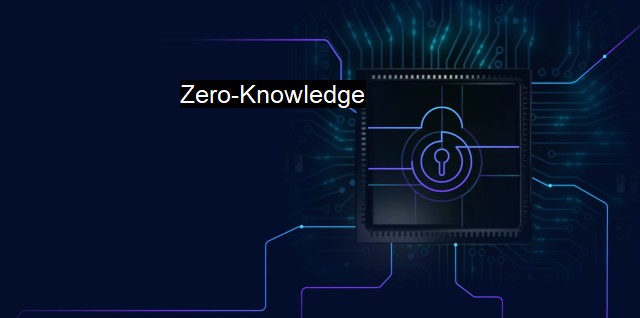What is Zero-Knowledge?
The Significance of Zero-Knowledge Proofs in Cybersecurity and Antivirus: Keeping Sensitive Information Secure
Zero-knowledge in the cybersecurity sector refers to proof-of-concept techniques that deliver assurance about a specific dataset or fact without revealing any additional or underlying information apart from the fact they are trying to prove. By leveraging mathematical rules and computations, a verifier can be convinced of the integrity of the data or facts without necessarily getting insight into the specific data or its structure.To dive deeper into this concept, let's use an example. Consider a well-known scenario where one person wants to prove to another that they know a password, without revealing the exact password. In this case, through zero-knowledge proof, it would be possible to prove password ownership or knowledge without revealing the password itself. This involves using a cryptographic hashing function where once the password goes through the function, it is not possible to get the original text from the output.
The concept is highly feasible and has significant implementation particularly in authentication, data security, and antivirus. Normally, to authenticate users, systems require them to disclose their passwords or PINs. Zero-knowledge eliminates the need to provide these personal credentials, consequently promoting data privacy and security.
For instance, when considered in the domain of antivirus software use, slight adaptations of the question "Are there any viruses in this file?" are manifest. Proving the 'yes' or 'no’ answer involves the analysis of metadata or monitoring file behavior for changes, effectively revealing the larger workings of the system. With zero-knowledge protocols, an antivirus could feasibly affirm whether a file contains a virus without the necessity for further probing into the system’s more intricate details, returning to basic principles of privacy, security and data integrity.
Another unique potential implementation of zero-knowledge proof in cybersecurity further involves secure transactions and storage. Secure cloud storage could be operated on the principles of zero-knowledge, denying the cloud provider access to the stored data. The user can therefore entrust their data in online platforms without worry, as this protective technology denies providers access to readable forms of their data. With the increasing amount of data breaches the world is experiencing, advancements in zero-knowledge proof in secure transactions could strengthen the protective networks around user data.
It is worth noting that there are trade-offs in the adoption and use of zero-knowledge proofs. As one might expect, this system relies substantially on complex computations that may not always be optimal given the diversity and quantity of digital platforms existing today. these computations may become especially hard to manage when interacting with a considerable amount of data. Also, the mathematical foundation of zero-knowledge proofs necessitates a set of skillful professionals able to structure, maintain, and improve such defensive strategies as data needs evolve.
As online environments continue to mature, the fight against breaches in privacy and data integrity looms larger. Innovative cryptographic techniques like zero-knowledge proofs offer more robust, if not perfect, safeguards against exploitation. And even if these methods aren't bulletproof, they still underscore cybersecurity’s intent to assure data security and user trust, which becomes increasingly crucial in our increasingly sophisticated, digital world.
Despite the challenges, it is apparent that zero-knowledge proofs can potentially revolutionize cybersecurity and antivirus systems by instituting a new layer of security where individuals and entities can securely verify data, perform transactions, and authenticate identities without compromising privacy. They offer a significant means of preserving user privacy while still keeping systems secure, hence, contributing positively to the ecosystems of antivirus software and further branches of cybersecurity. Increased utilization of zero-knowledge concepts thus enhances overall system and data security.

Zero-Knowledge FAQs
What is zero-knowledge technology?
Zero-knowledge technology is a security measure used in cybersecurity that allows two parties to share information without revealing any sensitive data or secrets. It ensures data privacy, integrity, and confidentiality.How does zero-knowledge technology work?
Zero-knowledge technology works by enabling two parties to prove to each other that they know certain information without actually revealing the information itself. This is done through a series of mathematical computations where information is obfuscated and only certain parts are shared.What are some applications of zero-knowledge technology in cybersecurity?
Zero-knowledge technology is used in cybersecurity primarily for authentication and secure communication. It is used in password authentication systems, VPN connections, and email encryption, to name a few examples.Is zero-knowledge technology foolproof?
While zero-knowledge technology is a powerful tool in cybersecurity, it is not foolproof. Attackers can still use side-channel attacks, timing attacks, or other advanced cryptographic attacks to compromise the system. However, using zero-knowledge technology is still considered to be one of the most secure ways of encrypting sensitive data.| | A | | | B | | | C | | | D | | | E | | | F | | | G | | | H | | | I | | | J | | | K | | | L | | | M | |
| | N | | | O | | | P | | | Q | | | R | | | S | | | T | | | U | | | V | | | W | | | X | | | Y | | | Z | |
| | 1 | | | 2 | | | 3 | | | 4 | | | 7 | | | 8 | | |||||||